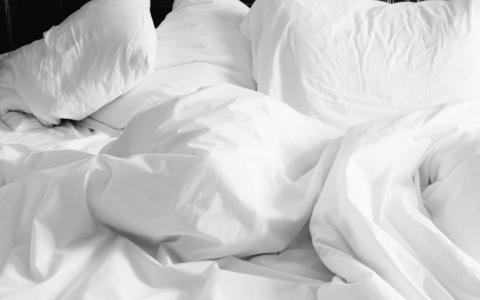
(Chicago Tribune) Damian Birkel went 40 years without knowing that he had sleep apnea.
Birkel, a light sleeper for most of his life, rose through the ranks as a buyer for several companies, including Macy's, Higbee's and Sara Lee, and managed brands like Farberware, Fuller Brush, Hanes, Bali, Playtex and Just My Size.
Birkel worked, traveled nationally and internationally for up to two weeks at a time and was a manager. Despite his career growth, he often missed the five to six REM sleep cycles the body needs to function, getting as little as two hours of restful sleep and once staying up for a full 24 hours. "I did the best that I could," he said.
Birkel's insufficient sleep often caught up with him at work.
"There were days at work, where people would be talking and I would nod off," Birkel said. "I had some bad days ... where I would be talking and then talk nonsense ... and then I would nod off to sleep mid-sentence."
Birkel even dozed off one day during a staff meeting with the president of a company he was working with at the time.
"The last thing that I remember is our company president introducing the corporate president."
He woke up at the end of the meeting and learned from his boss that he'd "snored loudly throughout the entire presentation."
"Of course there were a number of other choice words used that I will not share with you, but I think you get the picture," he said.
Birkel, the founder of job-help site Professionals In Transition, is far from the only senior-level employee with this problem.
A recent study from consumer site Savvy Sleeper found that 75% of managers don't feel well-rested. The average amount of sleep for poorly rested bosses was five hours and 17 minutes, well below the recommended seven to nine hours. Savvy Sleeper surveyed 5,350 people, 1,887 of whom held managerial or supervisory positions.
The Savvy Sleeper study found that over time managers who got a good night's sleep reported higher median annual income ($55,000 compared to $50,000 for poorly rested managers), higher productivity, less work-related stress and even better relationships with direct reports.
Birkel, who wasn't involved in the study, experienced this shift firsthand once he sought medical treatment for his lack of sleep after dozing off during the meeting. Birkel was diagnosed with sleep apnea, which he says caused him to stop breathing up to once every minute during sleep. Birkel's doctors prescribed Ambien (which he says he's now weaning himself off of) and fitted him for a CPAP machine.
The impact on his work was almost immediately noticeable.
He says his "thinking was clearer, my ability to manage people improved, my patience improved and at that time, I was able to exercise and lose weight and realize that this was what normal was, not the way that I had been living my life."
According to the Savvy Sleeper study, 77% of well-rested bosses gave out bonuses and 69% of them received bonuses. Less than half (49%) of all well-rested bosses said they struggled with fulfilling responsibilities compared to 67% of poorly rested bosses.
Birkel agreed that better sleep helped his in-office people skills.
"I wasn't cranky and when you come into work and you feel rested, you're in a much better position to read people, especially those who you work with very closely."
Sadly, for many working Americans, a good night's sleep remains elusive. Seventy-two percent of respondents to a recent Slumber Cloud survey reported that they tossed and turned through the night.
Dr. Susheel Patil, an assistant professor and clinical director of the Johns Hopkins University Sleep Medicine Program, said there is "a cultural issue not just within the United States but globally (that) the individuals who are perceived as being strong are those that are able to work long hours and perform under pressure. ... But what that does then is it devalues sleep."
Patil noted that research has shown that employees who get more sleep perform better than those who work late hours. Lack of sleep also leads to short-term problems that affect work performance like memory issues and slower completion times for tasks, as well as longer-term problems that could potentially affect a person's ability to work, including cardiovascular disease and diabetes.
But finding a balance between a demanding job and a healthy sleep schedule is often easier said than done. Marissa Tarleton, the CEO of couponing website RetailMeNot, knows this struggle all too well, but said she still makes getting enough sleep and exercise a priority.
"I usually sleep about 7.5 hours a night, getting in bed by 11 p.m. and up by 6:30 a.m. I like to get up early to run before work every day, or it won't happen. ... I would certainly welcome more sleep. But I do OK! Balancing leading RetailMeNot with my family priorities can be tough and all of that tends to cut into my sleep time," she wrote in an email.
Patil said that while it can be difficult to discuss how a job may be interfering with your ability to get enough sleep, it is necessary. Leaning on the support of other colleagues who feel the same way can help drive your office to be more "sleep friendly."
"Making sleep a priority is important. ... If employees are better rested and getting more sleep, that benefits the companies because then they're getting better performance out of their employees," Patil said.
Birkel advises prioritizing not only your health but also personal fulfillment over professional aspirations.
"There has never been a person that on their deathbed looks at the family and says, 'Damn, I wish I could have worked a little bit more,'" Birkel said. "You're only hurting yourself in the long run."



